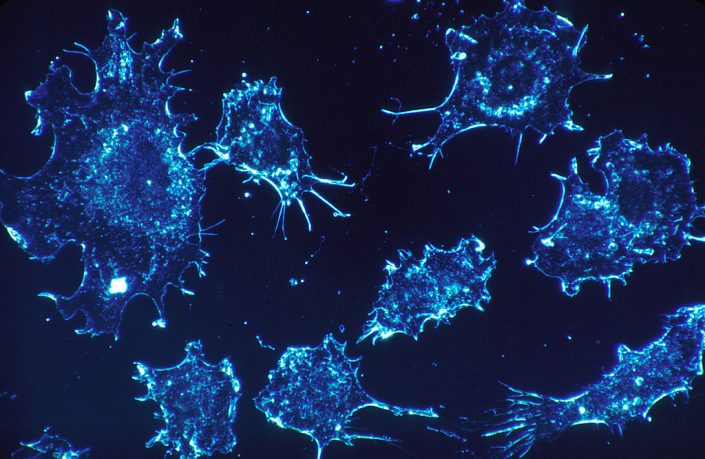CPRIT awards more than $9 million in cancer research grants to Texas A&M

Image: Wikimedia Commons
The Cancer Prevention and Research Institute of Texas (CPRIT) has awarded eight research grants to Texas A&M University totaling more than $9 million. The grants are among 60 new awards totaling more than $102 million that CPRIT recently announced in Austin.
Texas A&M Interim Vice President for Research Karen Butler-Purry said, “For the last eight years, CPRIT has delivered on its mission to provide financial support to cancer research across Texas. By funding these grants, CPRIT continues to demonstrate that Texas A&M, our faculty-researchers and their research teams are substantially advancing the state’s commitment to cancer research, treatment and prevention. We share an ultimate goal with CPRIT: to substantially impact breakthroughs to cure cancer in Texas, across the nation, and around the world.”
In all, Texas A&M garnered a total of $9,057,870 in funding from CPRIT, with slightly more than $7.7 million as academic research grants and $1.35 million for a prevention grant.
The largest of the research grants is a $5,793,075 award to Michael A. Mancini and Peter J. Davies, who serve as leads for the recently established Center for Advanced Microscopy and Image Informatics in the Institute of Biosciences and Technology, College of Medicine. This collaborative core facility provides cancer researchers with access to sophisticated imaging and computational resources that will enable them to address critical questions in both basic and translational cancer research. The funding will support the use of advanced imaging technology to develop new therapies for a wide range of cancers.
CPRIT also funded a $915,000 award to Robert Tsai, an associate professor in the Center for Translational Cancer Research, Institute of Biosciences and Technology, College of Medicine, to support a project titled, “Chemoablation of High-Risk Oral Premalignant Lesions for Sustained Cancer Prevention.” The project will support developing a non-invasive product to destroy mouth lesions that present a high risk of becoming cancerous.
Other academic research awards went to:
* Andrew Phillip West, an assistant professor in the Department of Microbial Pathogenesis and Immunology, College of Medicine, who received a $199,795 grant to fund a project titled, “Mitochondrial DNA Instability Engages a Cancer-Related Interferon Program to Modify the Immune Microenvironment and NAD+ Metabolome and Enhance Melanoma Growth.” The project will study how instability in mitochondrial DNA may encourage the growth of melanoma.
* Yi Xu, an associate professor at the Center for Infectious and Inflammatory Diseases, Institute of Biosciences and Technology, College of Medicine, who received a $200,000 grant to fund a project titled, “Identify Streptococcus gallolyticus Factors Important for Promoting Colorectal Tumor Development.” The funds will support research into how intestinal microbes may contribute to colorectal cancer.
* Yubin Zhou, an assistant professor in the Center for Translational Cancer Research, Institute of Biosciences and Technology, College of Medicine, who received a $200,000 grant to fund a project titled, “Optogenetic Toolkit for Precise Epigenome Editing in Cancer Cells.” The project will devise technology for locating and removing abnormal DNA within human genomes.
* Pushkar Lele, an assistant professor in the Department of Chemical Engineering, College of Engineering, who received a $200,000 grant to fund a project titled, “Etiology and Prevention of Gastric Cancers by Mitigation of H pylori Mechanosensing.” The project will conduct research into preventing gastric cancer through targeted mechanosensitive enzymes.
* Wenshe Liu, a professor and holder of the Emile and Marta Schweikert Professorship in Chemistry, Department of Chemistry, College of Science, who received a $200,000 grant to fund a project titled, “The Preparation of Novel Phage-Displayed Macrocyclic Peptide Libraries for the Identification of Anticancer Agents.” The grant will fund expanding the chemical diversity of a phage display library.
Texas A&M received a $1,350,000 prevention grant from CPRIT, awarded to David McClellan, a clinical assistant professor in the Family Medicine Residency program in the College of Medicine, and Jane Bolin, a professor in the Department of Health Policy and Management in the School of Public Health, to fund a project titled, “Continuation/Expansion of Texas A&M’s Breast and Cervical Cancer Prevention Program for Underserved Women through a Family Medicine Residency.” The grant will allow Texas A&M to continue to provide cancer-prevention services to women in nine Texas counties, while expanding services to eight other counties.
CPRIT provides funding through its academic research, prevention and product development research programs. In 2007, Texas voters approved a constitutional amendment to establish CPRIT with $3 billion in bonds. Since 2009, CPRIT has presented 1,189 grants totaling roughly $1.89 billion to support cancer research, product development and prevention programs. During the 85th Texas Legislature, CPRIT’s Sunset Review date was extended by two years to 2023 to allow the agency to fulfill its constitutional mandate to invest all funds approved by Texas voters. Programs made possible with CPRIT funding have reached all 254 counties of the state; brought more than 135 distinguished researchers to Texas; advanced scientific and clinical knowledge; and provided more than 3.9 million life-saving education, training, prevention and early detection services to Texans.

